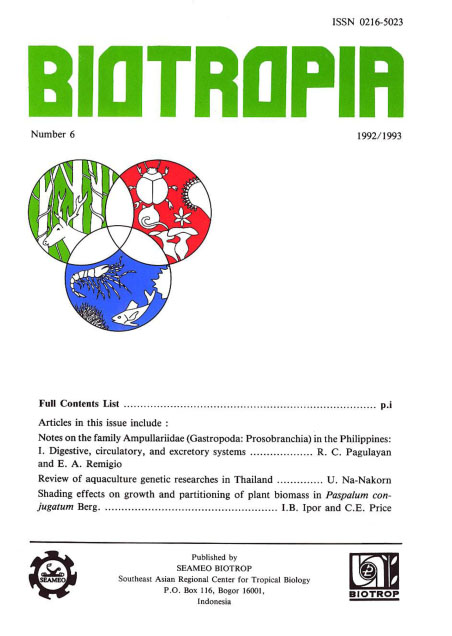
SEAMEO BIOTROP
Southeast Asian Ministers of Education Organization
694
views
Tags
NOTES ON THE FAMILY AMPULLARIIDAE (GASTROPODA: PROSOBRANCHIA) IN THE PHILIPPINES: I. DIGESTIVE, CIRCULATORY, AND EXCRETORY SYSTEMS
24 May 2019 - 02:48 pm (6 year ago)
Content Language : English
Content Language : English

Category :
Applied Science
A total of 232 ampullariid snails collected from 23 sites covering 7 islands in the Philippines were
compared conchologically and 200 alcohol-preserved specimens were dissected for anatomical
characteristics. Conchological comparison of the shells of the collected snails with that of identified lots from the
Senckenberg Natur-museum, Frankfurt, Germany, the British Museum for Natural History, London, England,
the Koninklijk Belgisch Instituut voor Natuurwetenschappen, Brussels, Belgium, and the Rijksmuseum voor
Natuurwetenschappen, Leiden, Netherlands, revealed the presence of 5 species in the collected samples. These
are: P. conica, P. ampullacea, P. mainitensis, P. quadrasi, and P. vittala. The latter 3 species were previously
reported as being indigenous to the Philippines.
Aside from characteristics of the shell, the morphology of the stomach may be useful for species
discrimination. P. quadrasi and P. vittata, however, do not seem to differ anatomically from P. conica.
compared conchologically and 200 alcohol-preserved specimens were dissected for anatomical
characteristics. Conchological comparison of the shells of the collected snails with that of identified lots from the
Senckenberg Natur-museum, Frankfurt, Germany, the British Museum for Natural History, London, England,
the Koninklijk Belgisch Instituut voor Natuurwetenschappen, Brussels, Belgium, and the Rijksmuseum voor
Natuurwetenschappen, Leiden, Netherlands, revealed the presence of 5 species in the collected samples. These
are: P. conica, P. ampullacea, P. mainitensis, P. quadrasi, and P. vittala. The latter 3 species were previously
reported as being indigenous to the Philippines.
Aside from characteristics of the shell, the morphology of the stomach may be useful for species
discrimination. P. quadrasi and P. vittata, however, do not seem to differ anatomically from P. conica.
Link

This work is licensed under a Creative Commons Attribution-NonCommercial-NoDerivatives 4.0 International License.
